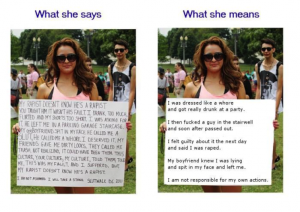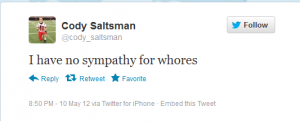Dealing with rape culture is an everyday contact. Women (of all ages and walks of life) have to deal with the utter nonsense that is spewed from the mouths of both women and men (however, we must acknowledge power systems and that men have the power in dominant societies and that what they say has more power because of the structures of society).
This is a shirt you can buy at Amazon.com
THIS IS OK TO SELL IN OUR SOCIETY – A profitable commodity.
These sentiments from Twitter are also highly liked sentiments:
These are actually some of the most benign tweets I could find. These are really sentiments by ‘educated’ citizens of our society. How we stop them? We prevent rapes by stopping rapists, not by interrogating rape victims. The “he was such a nice guy” argument is far too used and one that I’ve experienced first hand here on campus. With a recent, highly publicized sexual assault case, here on campus, the “he was such a nice guy” argument was used just as much as the “why would he rape HER…Maybe she’s lying” argument.
Focusing on the .3% of rape accusations that turn out to be false over the 90% of rape cases that go unreported is rape culture (@Sazza_jay). Thinking that she is lying is not only inflammatory, it is, statistically, virtually not an existent argument.
There’s also the STUPID argument that only “women who respect themselves deserve respect”…Only respecting modest women means not respecting any woman.
I (and most women) really don’t understand what is SOOOO hard to understand about this statement. It’s not rocket science! Get your Sh*t together, society.





